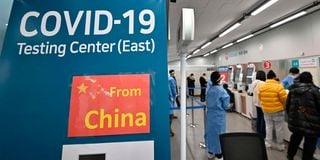Lockdown ‘hangover’ haunts China’s economy

Health workers guide travellers arriving from China at a Covid-19 testing centre at Incheon International Airport, west of Seoul on January 3, 2023.
China was on Sunday expected to stop requiring arriving passengers from going into quarantine, as long as they show proof of a negative test. But the end of one of the longest Covid-19 restrictions on earth may still leave lingering hangover for the Chinese, and the world that depends on Beijing.
One of the obvious lesson coming out of Beijing is that reopening the economy, following months of strict Covid-19 lockdowns, commonly known as the ‘zero policy’ could be that the hangover from longtime restrictions is just as hard to deal with as the pandemic itself.
Since November, the Chinese have been easing the ‘zero policy’ which was cited as the reason most businesses either shut down or faced lowest sales ever, or even sold them.
In December, Chinese Vice Prime Minister Sun Chunlan, who heads the country’s pandemic response argued the weakening nature of the virus and the improved numbers of vaccinations meant Beijing had to adjust its policy in line with protecting both the economy and the people.
On New Year’s Day, President Xi Jinping of China offered a promising year ahead, suggesting the country had moved from the challenges it faced in 2022,
“The Chinese economy enjoys strong resilience, tremendous potential and great vitality,” he said in a televised speech, whose transcript was circulated by Xinhua News agency.
“The fundamentals sustaining its long-term growth have remained strong. As long as we stay confident and strive for progress while maintaining stability, we will realise the goals we have set.”
In 2022, China’s economy exceeded 120 trillion Yuan ($17,5 trillion), even though its growth was nearly half the rate of the previous years where it averaged 5.1 percent. This year, it expects to grow more as the country launches its ambitious blueprint to become “a modern socialist country in all respects,” according to President Xi.
Wang Wenbin, spokesperson of the Chinese Foreign Ministry argued the easing of COVID policy is expected to help “China’s economy is expected to pick up further.”
Yet the effects of long restrictions may tie one of its hands on its back. Before Covid-19, Chinese manufacturers supported the lifeline of many countries including in Africa, helping a constant supply of goods ranging from clothes to electronics to machinery. Due to total lockdowns, however, many importers were unable to close deals and travel in and out of China was largely restrictive.
Last month, weeks after the zero policy was lifted, official data from the Chinese statistics agency said manufacturing activity had shrunk continually since September, the sharpest drop since Covid-19 was detected.
It showed that the official Purchasing Managers’ Index (PMI) fell to 47.0 from 48.0, according to the National Bureau of Statistics (NBS). Traditionally, 50 marks the separation of economic contraction from growth on a monthly basis.
Additionally, hospital admissions soared immediately after the easing of lockdowns and reports indicated some services such as supplies suffered as workers got ill or stayed away from working to avoid catching the cold.
With the unpredictable epidemic, people and companies generally have been reluctant to spend, suggesting the actual recovery could be slower.
On Wednesday, Mao Ning, Spokesperson of the Chinese Foreign Ministry suggested China will be able to live by the Covid-19 pandemic, in spite of the early bumps.
China is launching implementation programmes for decisions of last years’ 20th National Congress, the highest decision making organ of the Communist Party.
And Mao said China is ready to “contribute to world economic recovery and development.”
China’s rising infections, however, has seen countries impose travel restrictions on travellers from the country, which could still hurt business relations that had already been slowed by the pandemic.





